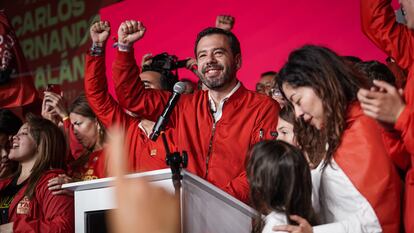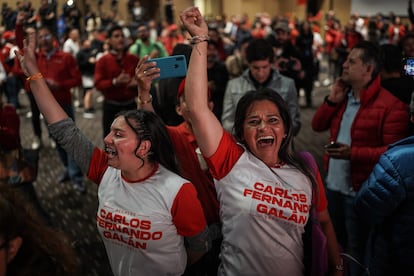Colombia regional elections: The political wave of change comes to a halt
Candidates from more traditional political backgrounds triumphed in the main mayoral and gubernatorial races, led by Carlos Fernando Galán’s resounding victory in Bogotá


The choice was clear: Sunday’s regional and local elections in Colombia could either strengthen or weaken the wave of political transformation that has been building in the country in recent years. And the result was also clear: the wave has lost steam. The main mayoralties and governorships were won by politicians from different sides of the political spectrum, but they had one thing in common: they came from traditional political parties or had the majority support of them. The elections marked the return of the status quo.
In 2019, alternative candidates won in several major cities such as Bogotá, Medellín, Cartagena and Cúcuta, and in smaller ones such as Buenaventura, Manizales and Palmira. In 2022 the traditional parties — Liberal, Conservative, Democratic Center, Radical Change, Social Party of National Unity — did not even have candidates for the presidency. These results contrast with the outcome of Sunday’s vote.
In addition to the victories of Alex Char, from Radical Change, in the mayoral race for Barranquilla; and Dilian Francisca Toro, from the Social Party of National Unity, in Valle del Cauca, politicians from traditional parties main other important gains. In other cases, the winning candidates — while not from a core traditional party — still show that that sector is making ground.
In Medellín, for example, the winner of the mayoral race, Federico Gutiérrez, had the support of a good part of the traditional political class in the presidential elections of 2019 and 2022. What’s more, unlike his predecessor Daniel Quintero, he did not campaign as an outsider against the political class. Similarly, in Bogotá, Carlos Fernando Galán — who was a member of Radical Change until five years ago — accepted support from traditional structures, something he had not done when he narrowly lost the mayoral race in 2019.

The change in the trend affects the Colombian government, since President Gustavo Petro was elected thanks to the wave seeking political change. What’s more, his party, the Historical Pact, was defeated in the mayoral race of Bogotá, where Petro himself had been mayor. “The survival of the Historical Pact is at stake in the Bogotá mayor’s office,” the party’s candidate, Gustavo Bolívar, told EL PAÍS at the beginning of the campaign. On Sunday, Bolívar came in third place, beaten by the independent, Juan Daniel Oviedo, as well as winner Carlos Fernando Galán, in what was a clear defeat for the left.
Bogotá, however, was not being governed by the left. The outgoing mayor, Claudia López, was a centrist politician who had supported Petro in the past, but in recent months, had come to blows with the president over the fate of the city’s first subway line. In Medellín, the government has lost a staunch supporter, with Daniel Quintero defeated by Federico Gutiérrez, a vocal critic of Petro.
In general, the Historical Pact and the parties that belong to the coalition scored poor results at Sunday’s election. The only exception was Luis Alfonso Escobar, who won the race in the department of Nariño. The left had lost that governorship in 2019 after holding power for 12 years. Now it has it back.
The shift can be attributed to the logic of local elections, with voters seeking to reward or punish their elected representatives. Since taking power in 2019, the winners of the last election have had to deal with problems stemming from the pandemic, such as rising unemployment and the spike in hunger and poverty. This took a heavy toll on the incumbents. Exceptions such as Barranquilla reflect the strong influence of issues specific to that city.
The question being asked now is how the results will affect national policy. The government is in a weaker position due to its defeat in Bogotá, but it will have a new chapter to define its relationship with the local powers. The national lawmakers allied to the winners may get closer to Petro in order to move forward with joint projects, or they may choose to distance themselves from a government with low approval ratings. The next few weeks will provide indications of how the results of the local and regional elections will impact the government.
Sign up for our weekly newsletter to get more English-language news coverage from EL PAÍS USA Edition
Tu suscripción se está usando en otro dispositivo
¿Quieres añadir otro usuario a tu suscripción?
Si continúas leyendo en este dispositivo, no se podrá leer en el otro.
FlechaTu suscripción se está usando en otro dispositivo y solo puedes acceder a EL PAÍS desde un dispositivo a la vez.
Si quieres compartir tu cuenta, cambia tu suscripción a la modalidad Premium, así podrás añadir otro usuario. Cada uno accederá con su propia cuenta de email, lo que os permitirá personalizar vuestra experiencia en EL PAÍS.
¿Tienes una suscripción de empresa? Accede aquí para contratar más cuentas.
En el caso de no saber quién está usando tu cuenta, te recomendamos cambiar tu contraseña aquí.
Si decides continuar compartiendo tu cuenta, este mensaje se mostrará en tu dispositivo y en el de la otra persona que está usando tu cuenta de forma indefinida, afectando a tu experiencia de lectura. Puedes consultar aquí los términos y condiciones de la suscripción digital.








































